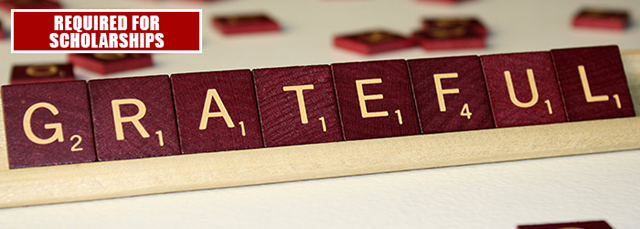Gratitude changes people. When once we see how much we have in this life, we cannot be the same. John D. Rockefeller, when asked how much money was enough, replied “just a little bit more.” Without Gratitude, we can never have enough, but when we reflect upon our many gifts, we find that the stress and tension of a state of perpetual discontentment fades away. Far too many in our day neglect this attitude of gratitude.
“Gratitude is not only the greatest of virtues, but the parent of all others.” ― Marcus Tullius Cicero
Virtue is the overflowing of oneself out toward others. This is why Cicero attributes so much value to gratitude by making it his chief or greatest virtue. Gratitude is what brings us to a place of outward living, as opposed to ingratitude or selfishness, which turns us inward. Only when we see how full our own life is with the blessings of what we are given, what we inherit, and what we have to enjoy, are we then able to look out to the needs of others and thereby evidence the virtues we own. Selflessness and gratitude walk hand in hand.
Traditionally, the Seven Virtues are: Chastity, Temperance, Charity, Diligence, Patience, Kindness, and Humility. Gratitude can be seen as making all these other virtues possible in our lives. When one is overwhelmed with thanksgiving for what he already has been given, he is set free from believing he needs “more.” This allows him to place things in their appropriate places. He can be chaste, or moderate, or loving, or one of the other virtues simply because he is satisfied with all that he already has.
Our culture fights against this idea. Desiring to make everyone a consumer, it must first convince us all that we don’t have enough. Robert George, commenting on the new book “A Nation of Takers — America’s Entitlement Epidemic” by Nicholas Eberstadt says: “a culture of dependency — and the entitlement mentality it breeds — undermines initiative, self-respect, the sense of personal responsibility, civic-mindedness, and other virtues that are indispensable to the flourishing of a free society.”
Ingratitude is a sure road to selfishness: always wanting more than we have. Gratitude, when cultivated in one’s life, provides the antidote to this constant craving for more. We learn that we can give to others out of our abundance, rather than seeking to be the first in the shopping line to get the next “deal.” Being satisfied, being thankful, having the attitude of gratitude, changes our whole vision for life.
Literary classics offer many pictures of what it is to live a life in gratitude. Victor Hugo’s Les Miserables is a notable example. The character of Jean Valjean and his beloved Cossette provide exchanges of gratitude one for the other that are unforgettable:
“When Cosette went out with him, she leaned on his arm, proud and happy, in the plenitude of her heart. Jean Valjean felt his heart melt within him with delight, at all these sparks of a tenderness so exclusive, so wholly satisfied with himself alone. The poor man trembled, inundated with angelic joy; he declared to himself ecstatically that this would last all their lives; he told himself that he really had not suffered sufficiently to merit so radiant a bliss, and he thanked God, in the depths of his soul, for having permitted him to be loved thus, he, a wretch, by that innocent being.”
Religious texts give us similar glimpses of the power of gratitude. As Cherie Harder from The Trinity Forum has observed, “The Bible is not subtle in its calls for thanksgiving. Repeatedly, urgently, and throughout its many books the reader is urged to ‘give thanks to the Lord, for He is good,’ and ‘in all things give thanks.’ In both Old and New Testaments, both Gospels and Epistles, we are urged to consider our blessings, and the character of the One from whom they flow, and to offer praise and thanks in response.
Centuries later, Martin Luther described gratitude as ‘the basic Christian attitude’ and the Puritan theologian Jonathan Edwards asserted that a spirit of thankfulness to God was an indicator of one’s spiritual state.
Why, one might wonder, is thankfulness so important?
The act of thanksgiving requires both memory and humility — both reflection on the causes and sources of gratitude, and the recognition of the blessing as a grace, rather than an entitlement. As such, a spirit of thanksgiving is incompatible with pride and distracted self-absorption, two of the greatest threats to spiritual life. It is virtually impossible to be thankful when one is distracted or indignant; thankfulness requires a laying aside of slights and irritations to focus on one’s unearned blessings and their source. A century ago, Henry Ward Beecher observed that: ‘Pride slays thanksgiving, but a humble mind is the soil out of which thanks naturally grows. A proud man is seldom a grateful man, for he never thinks he gets as much as he deserves.’
Recent studies have actually provided empirical evidence in support of the spiritual truth that a spirit of thanksgiving also reduces materialism (which is itself linked to reduced well-being and higher incidence of mental disorder) and self-absorption – and leads to greater generosity.
And indeed, the last decade has brought a flood of research showing that an ‘attitude of gratitude’ enhances one’s relationship, career, love life, productivity, optimism, resilience, sleep, energy levels, immune functioning, and propensity to optimism. Thankful people live longer, have more friends and stronger marriages, are more likely to volunteer and donate, are less likely to be depressed or addicted, find it easier to forgive and bounce back from disappointment, navigate transition, and have a clearer sense of their life’s purpose.”
Such research is a simple reminder of the truth that we were made to be thankful.” According to the Christian tradition, Harder concludes, “in giving thanks to the source of our blessings, we are not merely healthier and happier, but closer to who we were made to be, and what we were made for: to glorify God, and enjoy him forever. Ultimately, the act of thanksgiving is not only a call to worship, but an invitation to joy.”
Nothing brings more joy to a life than when a person has something to live for bigger than themself. The key to getting past simply living for self – becoming one who lives for others – is often grasping just how much we have to give to others. Those who give, gain. Those who give it all away, get back more than if they had held on to what they had. In this Thinker Education course experience, you will be challenged to think about gratitude and its effect on one’s life. The thesis, with which you may agree or disagree, is that you will live a better life once you realize how much you have been given – and how much you have to give.
Version 1.4








_17422494921.png )

